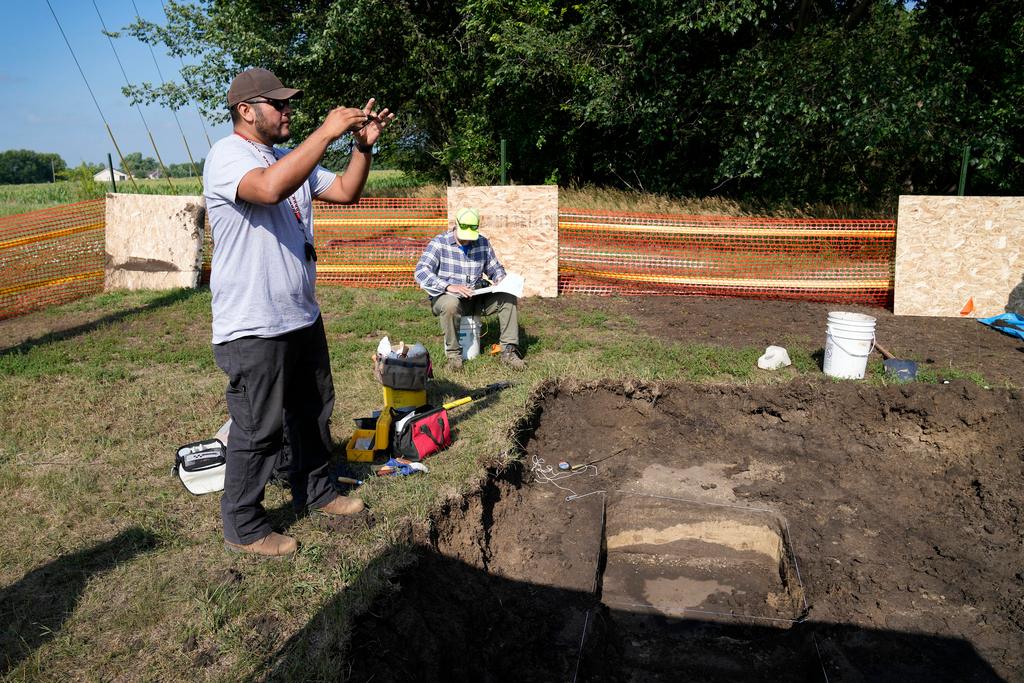
The immediate fate of two Venezuelan men who fear deportation to a prison in El Salvador may come down to the government’s failure on Monday to answer a simple, yet pointed, question from U.S. District Judge Charlotte Sweeney.
“What would be the harm?” in extending a temporary restraining order preventing the men from being sent abroad, Sweeney asked.
The government attorneys had no direct answer. And with that, Sweeney said she would likely make a ruling within 24 hours.
The hearing came after Sweeney decided last week to temporarily halt the federal government from deporting the men to a Salvadoran prison until she could hear arguments from both sides.
In the hour-long volley Monday morning between the federal government, the ACLU and immigration advocacy lawyers, it appeared that a seemingly skeptical Sweeney was leaning towards extending the ban on immediate removals.
This is the latest – and certainly most local – example of the fight between the advocacy and immigration lawyers and the Trump administration over its usage of the 1798 Alien Enemies Act.
The federal government is citing the wartime act as justification to remove hundreds of people from the United States to a prison in El Salvador, known for egregious human rights abuses.
The government says they are part of a “foreign incursion” and are members of the Venezuelan gang Tren de Aragua.
Over the weekend, the U.S. Supreme Court effectively told the federal government to pause deportations to El Salvador of detainees from the Northern District of Texas.
The ruling came after the federal government brought transportation to the Bluebonnet Detention Facility north of Abilene, Tex., last week and began busing men towards the border to planes bound for El Salvador. The men were given one-page notices in English, not Spanish, that they were deemed enemies of the United States and were being removed. The action sparked a flurry of court filings and the U.S. Supreme Court ruled in the middle of the night on Saturday morning.
The ACLU’s national strategy is to try and get temporary restraining orders from districts covering as much of the country as possible to prevent the U.S. from moving Venezuelan detainees, the government says are members of gangs, to jurisdictions where judges will let them be deported.
“We’re trying to stop the federal government from illegally and unconstitutionally removing people from the United States wherever it is they seem to do that,” said Tim Macdonald, the ACLU of Colorado’s legal director. “The federal government seems to be playing a game of whack-a-mole where they move people from places A, B and C to places where there isn’t a temporary restraining order.”
Macdonald told the federal judge on Monday that at least 11 Venezuelans who were at one point detained at the GEO Detention Facility in Aurora have been deported to the Salvadoran Terrorism Confinement Center, which has had documented cases of abuse and torture.
He also said lawyers with the Rocky Mountain Immigrant Advocacy Network have met with at least 100 other Venezuelans at GEO that they suspect could be at risk for Salvadoran transfer based on the Alien Enemies Act.
These 100-plus people, he noted, could eventually be part of a class action suit seeking to protect them from immediate deportation to El Salvador. It is unknown how many of those 100 people were living in Colorado prior to their ICE detention or whether they had been transferred to the Aurora facility from other places.
Justice Department lawyer Michael Velchik, who was arguing on behalf of the federal government on Monday, said the two men the ACLU of Colorado is representing in the initial petition for a temporary restraining order aren’t currently considered TdA gang members.
Sweeney questioned the ACLU about this, pressing whether the two men identified only by initials, D.B.U, a 32-year-old, and R.M.M., a 25-year-old, were the best examples of wrongful removal as a part of the bigger class.
Macdonald again accused the federal government of being dishonest. He said last week, one of them had a hearing in immigration court and the government said he had likely gang affiliations and an immigration court judge affirmed that position.
“The idea that the government could come in and manipulate the jurisdiction by saying … ‘they’re not currently being detained under the Alien Enemies Act,’ but as recently as Thursday, the government was standing up in immigration court making a case of gang affiliation just proves that this is a shell game,” he said in arguments to Sweeney. “They’re trying to strip the court of its ability to stop them from being deported.”
Velchik replied, “These two individuals have sworn affidavits … and there is no plan for them to be removed.”
“I’m sure you understand that’s no great comfort to say you’re not considered that now, when that could change,” Sweeney replied.
Sweeney asked Velchik if he could assure her the federal government would never again label these two men as Tren de Aragua gang members.
“Mathematically, we can’t rule out the possibility that the petitioners could … self-identify as members of TdA,” he replied. “So I’m not sure it would be appropriate for the government to permanently immunize these petitioners.”
Macdonald’s initial petition, filed last week, noted the two men, R.M.M. and D.B. U., were labeled gang members because of a party one of them attended and because of tattoos both have. One has tattoos of his mother’s name, his birth year and a character from the board game Monopoly. The other man has a tattoo of his niece’s name. Neither of them has gang ties, the ACLU said.
Instead, one was fleeing persecution in Venezuela when he crossed the Texas border and the other was fleeing dangers posed by TdA, the ACLU said.
Documents filed by the federal government state D.B.U. crossed the border in Eagle Pass, Tex., on Aug. 19, 2022. He was given a notice to appear in October 2022, initiating immigration court proceedings. His lawyers say he has filed an asylum claim to stay in the United States, but ICE encountered him at a party on January 26, 2025.
This party was raided by the Drug Enforcement Administration, though no criminal charges were ever filed from that investigation.
R.M.M. also entered at Eagle Pass in November 2023, the federal government said. The U.S. Customs and Border Patrol apparently referred his case to the Office of Refugee Resettlement and Immigration and Customs Enforcement, according to court documents. In November 2023, the Department of Homeland Security filed a notice to appear, which is an initiation of immigration court proceedings.
On March 1, 2025, ICE encountered R.M.M. during “an investigation” and took custody of him.
Standing outside the Alfred A. Arraj Federal Courthouse in downtown Denver, Macdonald said the federal government has acknowledged mistakes in these rapid removals to Salvadoran prisons, noting the case of the Maryland man, Kilmar Abrego Garcia.
“We have known they made mistakes,” he said.
Garcia was removed mistakenly, the government acknowledged, but has also refused to bring him back.
The federal government had no comment outside of the courtroom and Velchik, who was identified by other people in the court, would not give his name to reporters.
Macdonald said the ACLU is not trying to prevent the federal government from detaining either man in custody, nor is he making any arguments on their behalf on their pending asylum cases. He also said the federal government is free to file criminal cases against either of his clients. He’s just trying to make sure there is a guaranteed right to due process.
“It matters because if the government can remove these folks without due process, it erodes civil liberties for everyone of us and they could be next and we could be next,” he said. “If the government is able to dispense with due process, it’s a risk to liberty for all of us.”
| This story is part of a collection tracking the impacts of President Donald Trump’s second administration on the lives of everyday Coloradans. Since taking office, Trump has overhauled nearly every aspect of the federal government; journalists from CPR News, KRCC and Denverite are staying on top of what that means for you. Read more here. |
Funding for public media is at stake. Stand up and support what you value today.









